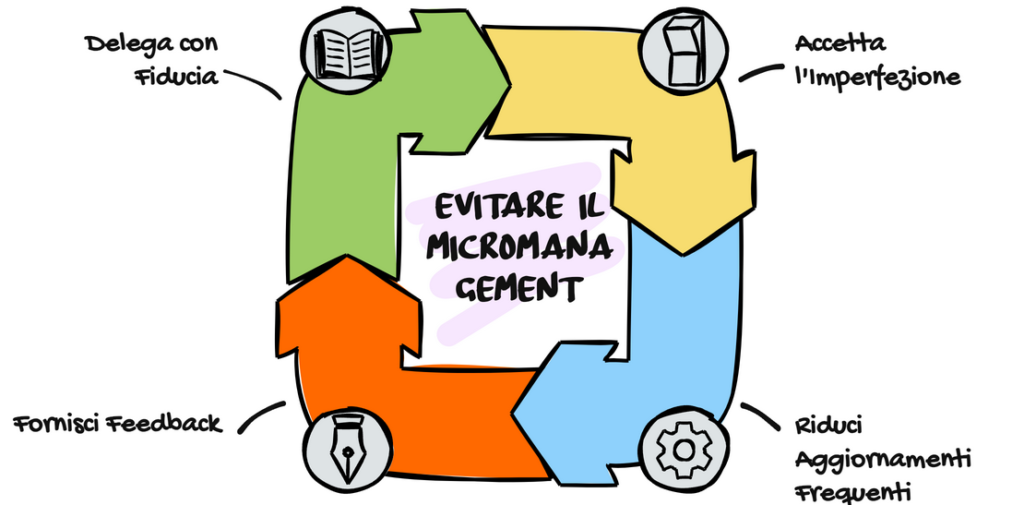📌 Micromanagement: The Art of Ruining Other People's Work with Style
There are two types of managers in the world: those who lead the team with vision and confidence, and those who They also check the size of the margins in PowerPoint because “you never know”.
If you've ever found yourself thinking:
- “Better if I do it, otherwise who knows what they'll do…”
- “I want to see every email before it’s sent!”
- “Why wasn’t that report written exactly the way I would have written it?”
Congratulations! You could be a professional micromanager.
And here's the bad news: micromanagement he never helped anyone.
In fact, it is the fastest way to demotivate the team, reduce productivity and condemn yourself to a nervous breakdown.
We see why micromanagement is the ultimate evil, How to recognize it And How to stop doing it before your team boycotts your company machine.
🚀 Why does micromanagement still exist?
1️⃣ “If I don't do it, it will go badly”
💡 The classic “nobody can do things like me” syndrome.
If no one in the team is capable, Maybe the problem isn't the team, but the way you manage it.
Also, hope that the activity, or worse yet activities, that only you can do really well, are 'one-off', because if they are very frequent you are signing to have the key to your prison thrown away. Good luck!
2️⃣ The obsession of detail
💡 Have you ever seen a manager proofread a presentation to change a font?
The Micromanager he can't see the bigger picture because he's too busy correcting commas in emails.
3️⃣ The fear of failure
💡 Delegating means accepting that someone might make mistakes.
If you never leave room for mistakes, you leave no room for growth.
🔍 Clear Signs You're Micromanaging
- Never truly delegate. You give a task and then you expect to be made aware of every comma that is changed and/or introduced and often you can't help but want to give your contribution (at all costs).
- Ask for continuous reports on everything or call meetings. If your team spends more time writing reports or having meetings than actually working, you're on the right track….
- Replacing your team. If you do other people's work, you're wasting your time.
- Correct unnecessary details. “That file should have been saved under a different name. Now do it again.” Really?
💥 How to stop micromanaging

1️⃣ Delegate (seriously) and then walk away
🚀 Give clear instructions and let people work.
2️⃣ Accept that not everything will be perfect (and that's okay!)
📌 Ask yourself: “Will this really change the bottom line?” If the answer is no, let it go.
3️⃣ Stop asking for updates every five minutes
📌 Set up regular, non-daily meetings for updates and trust the process.
4️⃣ Give feedback, not orders
📌 If someone made a mistake, don't do the work for him.
🚀 Please correct and explain how to improve.
🔥 📌 FAQ: Everything a Micromanager (Probably) Will Never Admit, But Should Know
The FAQ
💡 Do you suspect you’re a micromanager, but want one last test of confirmation? Or are you looking for a diplomatic way to let your superior know that he’s strangling the team with excessive control?
Here are five questions (and answers) that could save your team (and your sanity).
🛑 1. “But if I stop checking everything, how can I ensure that the work is done well?”
📌 Spoiler: It is not control that guarantees quality, but clarity in objectives and expectations.
💡 If you give precise instructions and clear goals, your team will know what to do without you breathing down their necks every five minutes.
🚀 Solution: Set reasonable checkpoints and let people work. If the result is not what you expected, perhaps you did not explain well what you wanted.
🛑 2. “What if someone makes a mistake?”
📌 Better question: “And if I never let anyone make mistakes, how will they learn?”
💡 Mistakes aren't the end of the world, they're part of the growth process. If you fix every detail before the employee even notices it, you're just depriving them of a learning opportunity.
🚀 Solution: Instead of intervening immediately, let people discover their mistakes and find solutions. If the damage is limited, a mistake today is better than an incompetent tomorrow.
🛑 3. “If I don’t follow them step by step, does that mean I’m not interested in their work?”
📌 No, it means you trust. And trust is a sign of leadership, not disinterest.
💡 The problem with micromanagers is that they confuse “being involved” with “being omnipresent.” A true leader is not about every detail, but about making sure the team knows how to handle the work.
🚀 Solution: Replace control with support. Ask “What do you need to do to do this well?” instead of “Show me what you’ve done right now!”
🛑 4. “But doesn’t delegating mean losing control?”
📌 No, delegating means giving responsibility, not abandoning the team to its fate.
💡 If delegation scares you, you’ve probably never really taught someone how to manage a task. Micromanaging becomes a vicious cycle: you leave no room, so no one grows, and you have to do everything yourself.
🚀 Solution: Start delegating with a clear plan: ✔ Give clear instructions and then walk away; ✔ Set alignment moments without overwhelming the team; ✔ Accept that the first results may not be perfect (and teach how to improve them, instead of redoing them yourself).
🛑 5. “If all my collaborators always ask me for confirmation before doing anything, it's because they are responsible, right?”
📌 No, it's because you've trained them not to take initiative.
💡 If your team doesn't make decisions without consulting you, you've probably created an environment where making mistakes is unacceptable and where the only safety is asking permission for every little thing.
🚀 Solution: When someone asks you “How should I do this?”, try answering: 👉 “How would you do it?” 👉 “Tell me your solution, then we’ll talk about it.” And you’ll see your team start taking initiative.
🔚 Do you want to control everything or do you want a team that works?
📌 Let's recap:
- ❌ Micromanagement kills motivation and productivity.
- ❌ If you do other people's work, you're not doing your own.
- ❌ If people don't take initiative, Maybe it's you who doesn't let him.
🚀 If you want to break free from micromanagement and build an autonomous team, OSM can help.
📌 Contact us here and discover how to become a true leader.
🔗 Other resources for further study
🔍 Learn more
✔️ Micromanaging Behavior and Employee Productivity in SMEs in Rivers State
A study by Amadi Martins Ndidi et al. (2022) published in the *International Journal of Research and Innovation in Social Science* that analyzes how micromanagement can create insecurity and disengagement among employees, while having useful applications in specific contexts.
✔️ What is Wrong with Micromanagement: Economic View
An economic analysis by S. Aguilar et al. (2021) published in the *Asian Journal of Economics and Banking* that highlights how micromanagement reduces productivity even in the absence of psychological distress, with negative effects accentuated by workforce diversity.
✔️ Understanding the Counterproductive Effects of Micromanagement in Leadership
A study by Misheck Samakao et al. (2023) published in the *International Journal of Research and Innovation in Social Science* that examines how micromanagement stifles workers' innovation, creativity, and self-esteem, promoting mistrust and insecurity.

😂